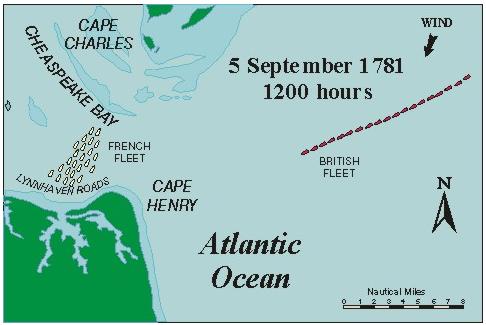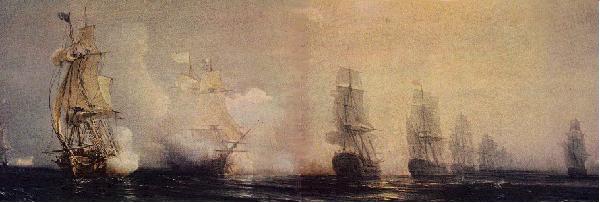
Sometimes known as the
.....and this was all French. Washington knew that sea power was essential to victory ashore - smart guy.
You need to read it all --- but next time you are leaving Norfolk for work or Striper fishing - remember that the birth of the freedom you enjoy is right under your keel.
The British Fleet continued its course southward without receiving any information from the cruisers which had been stationed off the Delaware River and Chesapeake Bay, and on the morning of the 5th of September, under a favourable north-northeast wind, it approached the capes of the Chesapeake. At 9.30 a. m. the frigate Solebay, scouting in advance of the fleet, "made the signal. for a Fleet in the S. W." The course of the British ships at this time was southwest by west, and at 10 a. m. Cape Henry bore west by south 6 leagues from the flagship London. A half hour later all the cruisers with the fleet were called in and the signal made to prepare for action. At 11 a. m. the signal was made for a line of battle ahead at 2 cables' length asunder, the French Fleet being now clearly visible at anchor and seemingly extending across the entrance to the bay, from Cape Henry to the Middle Ground. Having the wind, and the weather being fair, the British ships manoeuvred into position without difficulty and by noon all were getting into their stations. The log of the London at this time shows that Cape Henry bore west one-half south 4 or 5 leagues.
On the morning of the 5th of September the French Fleet was at anchor in Lynnhaven Roads awaiting tidings of the march of the allied armies under Washington and Rochambeau, and the return of the boats and crew sent up the James River. At 8 o'clock a frigate on the lookout signaled 27 sail in the east, steering toward Chesapeake Bay. It was evident from the number of sail that the fleet signaled was not that of Comte de Barras, which was expected hourly. The Comte de Grasse immediately ordered all hands to prepare for action; he recalled the rowboats that were out for water; and signaled the ships to be ready to weigh anchor. The tide by noon permitting the fleet to sail, cables were slipped, and the ships were manoeuvred with such celerity that notwithstanding the absence of nearly 90 officers and 1,800 men who had not yet returned from landing St. Simon's command, the fleet was under way in less than three quarters of an hour.










No comments:
Post a Comment